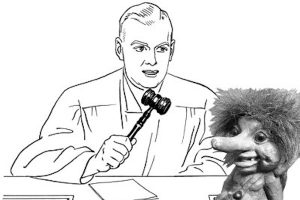Can a “Troll” Get a Fair Shake in Court?
 NEW YORK – When you consider the sort of company in which being deemed a “copyright troll” places a litigator, you can understand why an attorney would object to having the descriptor attached to her or his practice.
NEW YORK – When you consider the sort of company in which being deemed a “copyright troll” places a litigator, you can understand why an attorney would object to having the descriptor attached to her or his practice.
While referring to attorneys who file massive number of copyright cases as trolls is commonplace in comments posted online, it’s a lot less common for judges to use it, particularly in reference to litigators appearing in their courts.
When a judge does use such a loaded term, does it suggest bias against the party in question? Put another way, can a lawyer who has been dubbed a copyright troll by the judge hearing the case get a fair shake in court from that same judge? Attorney Richard Liebowitz, who is widely referred to as a copyright troll by those critical of his litigation tactics, believes the answer is no.
In a memorandum in support of his motion for Judge Lewis A. Kaplan to recuse himself from Sands v. Bauer Media Group, Liebowitz complains: “Once a person labels another human being as a ‘troll,’ certain truths become self-evident, the most obvious being that any actions taken by the so-called ‘troll’ will be perceived through the lens of that negative stereotype, and any judgments rendered will inevitably function to confirm that hostile perception.”
In his memorandum, Liebowitz asserts Kaplan deems him a troll based on a single factor – namely the enormous number of cases Liebowitz has filed on behalf of his clients in recent years.
“Judge Kaplan believes it is fitting to describe Mr. Liebowitz as a ‘copyright troll’ based on nothing more than the high volume of cases filed by Mr. Liebowitz in the last four years,” Liebowitz writes. “Judge Kaplan blames the high volume of infringement cases squarely on Mr. Liebowitz, stating ‘this deluge [of cases] is attributable to plaintiff’s counsel in this case.’ But that would be like blaming the DEA for all the drug traffickers it prosecutes, rather than the traffickers themselves. It’s not Mr. Liebowitz’s fault that the publishing community steals photographs en masse. He is appropriately responding to an epidemic of intellectual property theft which has pervaded American media companies, who have found it more cost efficient to steal photographs than to abide by federal law.”
As Liebowitz sees it, Judge Kaplan’s problem isn’t with Liebowitz himself, but with copyright law itself.
“While Judge Kaplan may have a problem with the Copyright Act as written, and doesn’t believe that meritorious infringement claims of modest value should be litigated, it is not his role as a member of the Article III branch to pass judgment on Mr. Liebowitz’s so called ‘business model,” Liebowitz writes. “It is Judge Kaplan’s role as an Article III officer to adjudicate the cases to which he is assigned based on the Congressional laws that have been enacted.”
Liebowitz further claims that “actual personal bias” against him has been demonstrated by Kaplan in three ways.
“First, judicial use of broad, defamatory stereotypes to personally label an Officer of the Court clearly evinces animus,” Liebowitz asserts. “Second, there can be no serious dispute that the term ‘troll’ is highly pejorative and serves no other function than to denigrate and stereotype. Third, the term ‘copyright troll’ is by no means a well-settled legal term of art, particularly as applied here.”
Liebowitz also takes issue with being lumped in with the likes of Malibu Media – and seems to suggest that since his client doesn’t produce pornography, Liebowitz himself shouldn’t be analogized to the attorneys who represent adult entertainment studios, even though he shares their tendency to file an enormous number of complaints.
“None of the factors identified by Judge Hellerstein, as they pertained to Malibu Media, LLC, apply to Richard Liebowitz, who represents world-class celebrity photographers and working-class photojournalists, virtually all of whom are living, breathing human beings who actively contribute to the Progress of the useful Arts,” Liebowitz writes, later adding that “unlike the pornographer-plaintiffs, Liebowitz’s efforts have largely been met with success in terms of judgments on the merits.”
As noted by Blake Brittain in a piece for Bloomberg Law, Kaplan is not the first judge to label Liebowitz a copyright troll. Two other judges from the same district, the Southern District of New York, have also termed the attorney a troll.
In the view of Judge Denise Cote, it was the “astonishing volume of filings coupled with an astonishing rate of voluntary dismissals and quick settlement” which led her to apply the term to Liebowitz. For Judge Ronnie Abrams, it was the attorney’s “propensity to take unreasonable positions and to omit crucial facts – or even make outright misrepresentations – in an apparent attempt to increase costs and to extort unwarranted settlements.”
Regardless of whether Kaplan ultimately recuses himself in this case, Liebowitz makes some compelling points in his memorandum. Whether Liebowitz is the right litigant to make those points, especially given what Judge Abrams wrote in the quote excerpted above, is another question altogether. If Liebowitz truly is making “outright misrepresentations” and omitting crucial facts, then he may be far more deserving of the troll epithet than his protestations to the contrary would have us believe.
Either way, the increasingly cavalier attitude towards copyright law exhibited by many internet users – not just individuals but some major media companies, as well – all but guarantees judges like Kaplan will be required to continue to wrestle with an uncomfortable question: Are the attorneys representing vast numbers of copyright plaintiffs in their courts “trolls,” or just lawyers trying to do their job in the challenging legal and public policy environment presented by the nature of internet and associated technologies?












